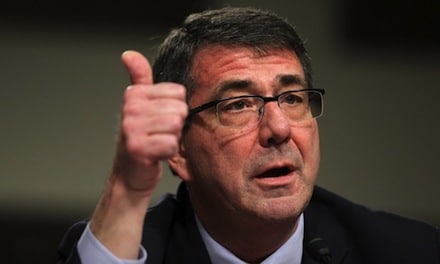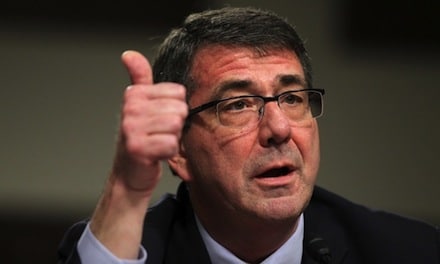When President Dwight D. Eisenhower on January 17, 1961 delivered his farewell address and warned about the Military-Industrial Complex, he surely was thinking of men like Ashton Carter, the new Secretary of Defense.
Carter appears to move easily between the higher echelons of the military and the business world.
From October 2011 to December 2013, he served as the Department of Defense’s Chief Operating Officer overseeing more than $600 billion per year. During the Bush administration, he was a member of Secretary of State Condoleezza Rice’s International Security Advisory Board; co-chair of the Senate Foreign Relations Committee’s Policy Advisory Group; a consultant to the Defense Science Board; a member of the National Missile Defense White Team; and a member of the National Academy of Sciences Committee on International Security and Arms Control.
When not working in a military capacity and doling out of billions, he has worked in the private sector for many of the firms that have benefited handsomely from the billions spent by the Defense Department.
He has served on the Boards of Directors of the MITRE Corporation, Mitretek Systems, MIT Lincoln Laboratory, and as a member of the Draper Laboratory corporation.
The MITRE Corporation manages Federally Funded Research and Development Centers supporting the Department of Defense, among other government agencies.
Mitretek Systems has focused, among other things, on national security threats, chemical and biological warfare and biometrics, (The organization has changed its name to Noblis.)
The MIT Lincoln Laboratory is a Department of Defense research and development center.
Draper works in the area of Air Warfare and ISR—Intelligence technology for targeting and target planning applications.
In addition to the board seats, Carter is a member of the Council on Foreign Relations and the Aspen Strategy Group.
Carter was recently a senior partner at the secretive Global Technology Partners. According to Source Watch:
Global Technology Partners, LLC is a specialized group of investment professionals who have formed a strategic relationship with DLJ Merchant Banking Partners (Donaldson, Lufkin & Jenrette Merchant Banking Partners)[5] to acquire and invest in technology, defense, aerospace and related businesses worldwide. The senior partners consist of Dr. William J. Perry, former US Secretary of Defense; Dr. John Mark Deutch, former Director of Central Intelligence for the US and former US Secretary of Defense; Dr. John P. White, former US Deputy Secretary of Defense; Dr. Paul G. Kaminski, former US Undersecretary of Defense for Acquisition and Technology; Dr. Robert J. Hermann, former Director of the National Reconnaissance Office; and Irving B. Yoskowitz, former Executive Vice President and General Councel for the United Technologies Corporation. DLJ Merchant Banking Partners is one of the largest private equity firms in the world, with committed capital of over $8 billion.
And, not surprisingly, Carter was an advisor to Goldman Sachs on “global affairs.”
The neocons are going to love him in his new DOD role, as will the entire military-industrial complex. In 2006, he authored a report advocating use or threat of force to prevent Iran from obtaining nuclear weapons for the Carnegie Endowment for International Peace.
The Times of Israel reports:
[Ashton Carter] seen as loud proponent of a tougher stance on Iran, quiet supporter of Israel…
His first official trip to Israel was in 2013 — shortly after a visit by Defense Minister Moshe Ya’alon. Carter met with Ya’alon, then-national security adviser Yaakov Amidror and Defense Ministry Director Udi Shani, who hosted an official dinner for him.
Observing members of the Oketz IDF Canine Unit, Carter told the soldiers that “protecting America means protecting Israel, and that’s why we’re here in the first place.”…
Although the Obama administration has repeatedly emphasized that “all options are still on the table [with regard to Iran],” Carter would likely be seen as the cabinet member placing the greatest emphasis on the military component of the ongoing negotiations.
Robert Wenzel is Editor & Publisher at EconomicPolicyJournal.com and at Target Liberty.
Reprinted with author’s permission.


